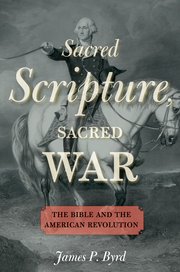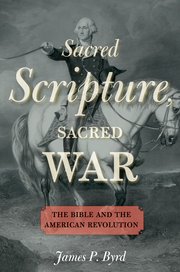 James P. Byrd, Sacred Scripture, Sacred War: The Bible and the American Revolution (New York: Oxford University Press, 2013). $27.95, 256 pages.
James P. Byrd, Sacred Scripture, Sacred War: The Bible and the American Revolution (New York: Oxford University Press, 2013). $27.95, 256 pages.
This past Fourth of July, the Freedom from Religion Foundation took out a full-page ad in a number of newspapers, the banner of which proclaimed, “Celebrate Our Godless Constitution.” According to FFRF’s description of it, the ad quoted “U.S. Founders and Framers on their strong views against religion in government, and often critical views on religion in general.” Its purpose was to counter Hobby Lobby’s annual July 4th ad, which “shamelessly promote[s] the myth that the United States was founded on God and Christianity.”
The ad is strange for several reasons. For one thing, the Fourth of July celebrates the decidedly non-godless Declaration of Independence, not the supposedly godless Constitution. For another, three of the six Founders quoted—Thomas Paine, John Adams, and Thomas Jefferson—were not part of the convention that drafted the Constitution. And finally, the ad selectively quotes the Founders, overlooking the more benign view of religion found in other statements by them. (For a balanced overview of the role of religion in the Founding, see the Library of Congress’s exhibit, “Religion and the Founding of the American Republic.”)
I mention this ad not so much to refute it as to provide context for my review of James P. Byrd’s excellent new book, Sacred Scripture, Sacred War: The Bible and the American Revolution. Before we enlist history on one side or another of a contemporary political cause—whether on behalf of FFRF’s secularism or Hobby Lobby’s Christian nationalism—we must understand it on its own terms. Failing to do so results in anachronistic, selective readings of history that misinform—sometimes, intentionally disinform—rather than inform the readers.
The focus of Sacred Scripture, Sacred War is “how the Bible inspired patriotism in Revolutionary America” (p. 2). Byrd approvingly quotes Gordon S. Wood on this topic: “it was the clergy who made the Revolution meaningful for most common people” because “for every gentleman who read a scholarly pamphlet and delved into Whig and ancient history for an explanation of events, there were dozens of ordinary people who read the Bible and looked to their ministers for an interpretation of what the Revolution meant” (ibid).
To see how the Bible inspired patriotism, Byrd compiled what he describes as “the most comprehensive database on the Bible in colonial America, including 17,148 biblical citations from 543 sources over more than a century (1674–1800)” (p. 169). Based on this database, he identified the eight “most cited biblical chapters (50 or more citations) in the Revolutionary Era (1763–1800)”: Romans 13, Exodus 14–15, Galatians 5, Judges 4–5, 1 Peter 2, 1 Kings 12, Psalm 124, and Matthew 5 (p. 170). Successive chapters in Sacred Scripture, Sacred War describe how Patriots used these passages to buttress their revolutionary resolve, often in the teeth of Loyalist criticism.
Not surprisingly, patriotic clergy often turned to martial passages in the Old Testament to exhort their parishioners both to die and to kill for the revolutionary cause. God’s deliverance of Israel from slavery in Egypt, accomplished by divine war against Pharaoh and his army, was an obvious choice for revolutionary preachers. So was the boldness of Deborah and Jael against Sisera the Canaanite general Sisera. Then, of course, there was David, who combined both martial prowess with spiritual depth, serving as a model for Patriot soldiers. (The fact that David was a king required some finessing on the part of preachers.)
More controversially, patriotic clergy rooted support for the Revolution in New Testament texts. “Stand fast therefore in the liberty wherewith Christ hath made us free” (Galatians 5) was a biblical motto for the Revolution. Other New Testament passages required significant re-interpretation. Should Patriots submit to the king as Paul and Peter commanded (Romans 13, 1 Peter 2)? John Wesley certainly thought so, but patriotic clergy argued that obedience was owed only to just kings. Didn’t Jesus command his followers to turn the other cheek and love their enemies (Matthew 5)? Yes, but Revelation also portrayed Jesus—like God in the Old Testament—as a man of war.
Having surveyed the use of select biblical passages by Patriots, Byrd identifies three roles the Bible played in the Revolution (pp. 164–166): “Its primary purpose was to forge militant patriotism.” Second, it underwrote republicanism. Byrd quotes Rev. John Mellen, whose view was common among Patriots: “liberty is the spirit and genius, not only of the gospel, but of the whole of that revelation, we have, first and last, received from God.” Third, it provided “virtuous heroes” for Patriots to emulate.
One need not agree with Patriot exegesis of Scripture in order to appreciate the role it played in their revolutionary cause. Byrd’s task in Sacred Scripture, Sacred War is descriptive, not normative. That is, he describes how Patriots used the Bible; he doesn’t judge their use of it. That is the task of Christian theologians, not historians. For my part—American patriot that I am—I nonetheless unsettled by how my colleagues in the 18th-century clergy used the Bible in the cause of war. (Of course, on the other side, Loyalist uses of Scripture generated their own set of exegetical problems.)
Regardless of my reservations about Patriot exegesis, I am unreservedly appreciative of James P. Byrd’s analysis of it, and heartily recommend it to readers interested the role religion played in the American Founding. Perhaps some open-minded person at the Freedom from Religion Foundation will read it too and come to realize that both the godly and the godless felt they had a stake in the Revolution.
P.S. If you’re interested in reading some of those patriotic sermons, check out
P.P.S. If you found my review helpful, please vote “Yes” on my Amazon.com review page.


Excellent review. Appreciate your balanced approach, both to the book and to the subject.